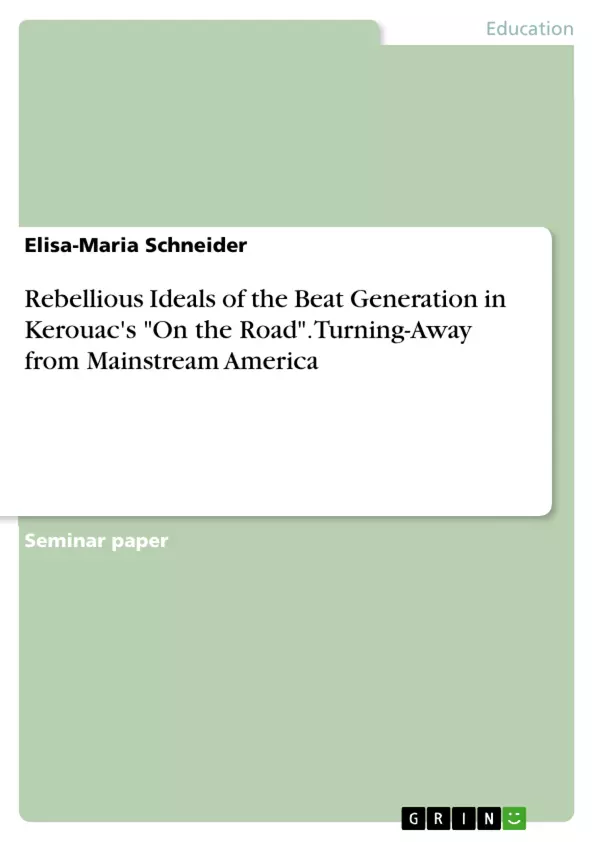This paper deals with the portrayal of the essential beliefs and ideals of the Beat Generation in Jack Kerouac’s novel “On the Road”. It will prove that these beliefs are illustrated through the lifestyles of Sal Paradise and Dean Moriarty during their journey. As the major characters of the novel, who clearly did not live up to society’s expectations of Post-War-America Dean and Sal are the prefect examples for the beats. To achieve this aim, this paper will critically examine how the ideas of the Beat Generation can be found in the novel.
The ideals referred to will include a non-conformity towards society’s expectations and a rebellious attitude towards the mainstream society. Furthermore, an inner drive to travel, to be on the road and to search for meaning are reoccurring motifs and beliefs of the protagonists. Lastly, Sal and Dean start to turn towards different, Non-American cultures, in order to find the meaning of life.
The paper will begin with an examination of the rebellious attitude of the protagonists to find the motivation and source of their rebellion, which leads to their non-conformity. Regarding the mentioned non-conformity, the paper will investigate how Sal and Dean did not conform to given rules and expectations and to what extent they carried out their non-conformism. Moreover, the underlying meaning of the journeys in the novel and the reason for their transcendental reach will be surveyed. Additionally, the paper will examine if Sal and Dean even knew why they were traveling and searching, or if they were on the road for the sake of being on the move.
Table of Contents
- Introduction
- The Ideals of the Beat Generation in On the Road
- Non-Conformity and Rebellion
- Dean Moriarty as the Embodiment of the Beat Non-Conformist
- Dean Moriarty, Women and Gender Roles
- Dean Moriarty, the Holy Goof
- Being on the Road
- Going Westwards
- Fleeing an Imposed Lifestyle
- The Transcendental Aspect of The Road
- Turning Towards Non-White Cultures
- The African-American Culture
- The Mexican Culture
- Conclusion
- Works Cited
Objectives and Key Themes
This paper examines the rebellious ideals of the Beat Generation, as portrayed in Jack Kerouac's novel On the Road. The paper analyzes how the protagonists, Sal Paradise and Dean Moriarty, embody the nonconformity and rejection of mainstream American values that characterized the Beat movement. It delves into the motivations behind their rebellious lifestyle, their search for meaning through travel, and their embrace of non-white cultures.
- Nonconformity and Rebellion against societal expectations
- The Beat Generation's rejection of mainstream American values
- The importance of travel and searching for meaning
- Exploration of non-white cultures as a means of finding meaning
- The embodiment of Beat ideals in the characters of Sal Paradise and Dean Moriarty
Chapter Summaries
The introduction explores the context of the Beat Generation, situating it within the post-war era and its emphasis on conformity. It highlights the characters' rejection of this expected lifestyle, particularly Dean Moriarty, who represents the essence of the Beat nonconformist. The paper then examines the Beat Generation's ideals, highlighting their rejection of mainstream values and their pursuit of a more authentic existence.
The chapter on non-conformity and rebellion explores Dean Moriarty's character in detail, highlighting his unconventional lifestyle and his rebellious attitude towards societal expectations. The analysis delves into how Dean's background and experiences contribute to his embrace of the Beat ethos. The paper also examines the portrayal of the Beat Generation within On the Road, emphasizing their position as outcasts and their rejection of the American meritocracy.
The chapter on being on the road explores the significance of travel for the Beat Generation. It examines the motivations behind the characters' journeys, their desire to escape the confines of a conventional life, and their search for meaning through constant movement.
The chapter on turning towards non-white cultures analyzes the characters' interactions with African-American and Mexican cultures. It explores the reasons for their interest in these cultures and the ways in which they find a sense of belonging and meaning outside of their own society.
Keywords
The key themes and concepts explored in this paper include the Beat Generation, nonconformity, rebellion, travel, meaning, African-American culture, Mexican culture, and the American Dream. The paper also focuses on the characters of Sal Paradise and Dean Moriarty as representations of the Beat ethos.
Frequently Asked Questions
How does "On the Road" portray the ideals of the Beat Generation?
The novel illustrates ideals like non-conformity, rebellion against mainstream society, and the search for authentic meaning through travel.
Why is Dean Moriarty considered the embodiment of the Beat non-conformist?
Dean rejects traditional gender roles, meritocracy, and social expectations, living a life of constant movement and spontaneous experience.
What is the significance of "the road" in Kerouac's work?
The road represents a transcendental space for freedom and self-discovery, allowing characters to flee imposed lifestyles in post-war America.
How do the protagonists view non-white cultures?
Sal and Dean turn towards African-American and Mexican cultures, seeking a sense of belonging and vitality they feel is missing in white mainstream society.
What is the main conflict described in the paper?
The conflict lies between the rebellious attitudes of the Beats and the rigid expectations of post-war American society.
- Quote paper
- Elisa-Maria Schneider (Author), 2017, Rebellious Ideals of the Beat Generation in Kerouac's "On the Road". Turning-Away from Mainstream America, Munich, GRIN Verlag, https://www.hausarbeiten.de/document/983727


